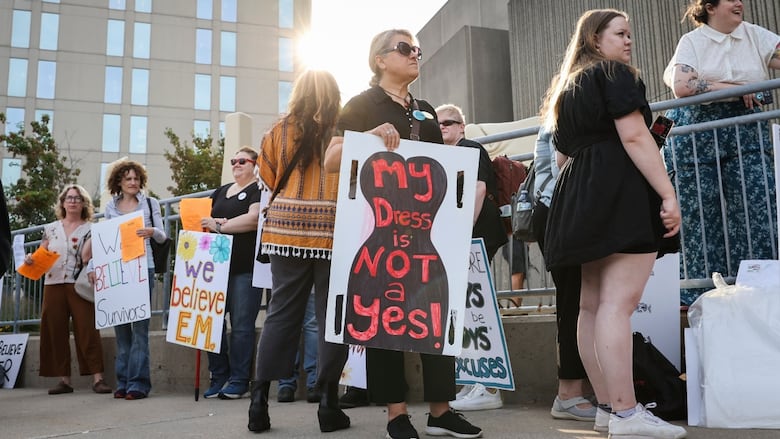Hockey Canada trial outcome a 'crushing day' for sexual assault survivors, says prof
All 5 members of Canada's world junior hockey team found not guilty in sex assault trial


WARNING: This article may affect those who have experienced sexual violence or know someone affected by it.
The woman at the heart of the Hockey Canada sexual assault trial may not have gotten the outcome she was hoping for, but her testimony has opened up much-needed conversations about consent and hockey culture, says an Ottawa lawyer.
A judge on Thursday found the five accused — all former members of Canada's 2018 world junior hockey team — not guilty of sexually assaulting a woman named E.M. in a London, Ont., hotel room seven years ago.
Ontario Superior Court Justice Maria Carroccia said prosecutors could not meet the onus of proof for the charges against Michael McLeod, Carter Hart, Alex Formenton, Dillon Dubé and Callan Foote.
In her ruling, Carroccia said E.M. was repeatedly inconsistent in her testimony, failed to prove the sexual encounters were not consensual, and didn't appear on surveillance footage to be as intoxicated as she claimed on the night in question.
After the decision, lawyers for all five plaintiffs took turns addressing reporters. Hart's lawyer Megan Savard called the ruling "both gratifying and unsurprising." David Humphrey, lawyer for Michael McLeod, called it "a resounding vindication."
But Karen Bellehumeur, E.M.'s lawyer, called it disappointing. She credited her client for enduring nine days of testimony and cross-examination that she characterized as "insulting, unfair, mocking and disrespectful."
"She is a remarkable person and truly a hero," Bellehumeur said of E.M. "Despite her feeling like this was the hardest thing she's ever had to do, she chose to persevere and continue with the process."
Daphne Gilbert, a law professor at the University of Ottawa who researches violence in sports, called the verdict a "crushing day" for sexual assault survivors, and worries it will make victims think twice about coming forward. Here is part of her conversation with As It Happens guest host Megan Williams about the trial and its impact.
What do you think about the trial outcome?
I'm not surprised that there were acquittals. This is an excellent judge who has an excellent reputation, and I could see a pathway to acquittal. It was just not the pathway that she chose that I would have agreed with.
To me, the evidence was clear that E.M. did not consent to what was happening in that room. And so what I was hoping is that the judge would take that and say, "But did the men have an honest, but mistaken, belief that she was consenting?"
That would have allowed her to dig deeper into what the men were doing, and how they were behaving, and whether they actually took any reasonable steps to make sure she was affirmatively consenting without intimidation or coercion or intoxication.

Justice Maria Carroccia said that she found E.M., in fact, did consent, "not vitiated by fear." What does that wording say to you about how Justice Carroccia came to this decision?
It says to me, quite frankly, that she did not see up to 10 men in a room with a naked woman, where they all know each other and she doesn't know them, and many of them don't even know her name, that she didn't perceive that as an intimidating situation.
And I think that just defies common sense and logic.
A big part of the trial was around two videos that defendant Michael McLeod took of E.M. in the hotel room, one in which she's only wearing a towel, where she says that she is OK with what has happened to her. Justice Carroccia said E. M. did not display any signs of intoxication and had no difficulty speaking. How much do you think these videos played into the decision?
I certainly do not think that Justice Carroccia relied on them as evidence of consent. She didn't say that because we had these videos, we can assume she was consenting. That would have been an error in law. There's no such thing as after-the-fact consent.
It seemed to me that the justice was referring to the videos to say that she wasn't as intoxicated as she had claimed that she was. The videos were taken at the end of the night, several hours after she had consumed the alcohol, and perhaps it's true she didn't appear intoxicated. But the Crown wasn't arguing that she was intoxicated to the point of incapacity, so I'm not sure why that needed to be mentioned.
How do you think this kind of ruling will affect consent going forward, and particularly in the world of sports?
The only good thing, I think — and it's at a credible cost to E.M. — but she has provoked conversations across the country about consent and about appropriate behaviour and about bystander intervention and about right and wrong.
Those conversations in families with young men and boys, I think, is where we have to start in terms of changing especially hockey culture. Families will be talking about hockey players and and saying, I think, "This is not how I want you to be behaving."
With files from CBC News and The Canadian Press. Interview produced by Sarah Jackson. Q&A edited for length and clarity

